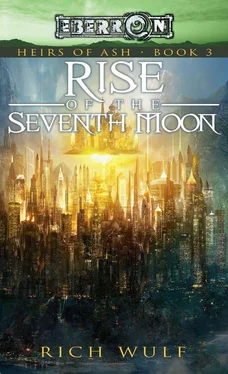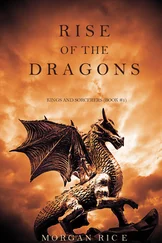Rich Wulf - Rise of the Seventh Moon
Здесь есть возможность читать онлайн «Rich Wulf - Rise of the Seventh Moon» весь текст электронной книги совершенно бесплатно (целиком полную версию без сокращений). В некоторых случаях можно слушать аудио, скачать через торрент в формате fb2 и присутствует краткое содержание. Год выпуска: 2013, ISBN: 2013, Издательство: Wizards of the Coast Publishing, Жанр: Фэнтези, на английском языке. Описание произведения, (предисловие) а так же отзывы посетителей доступны на портале библиотеки ЛибКат.
- Название:Rise of the Seventh Moon
- Автор:
- Издательство:Wizards of the Coast Publishing
- Жанр:
- Год:2013
- ISBN:9780786964925
- Рейтинг книги:5 / 5. Голосов: 1
-
Избранное:Добавить в избранное
- Отзывы:
-
Ваша оценка:
- 100
- 1
- 2
- 3
- 4
- 5
Rise of the Seventh Moon: краткое содержание, описание и аннотация
Предлагаем к чтению аннотацию, описание, краткое содержание или предисловие (зависит от того, что написал сам автор книги «Rise of the Seventh Moon»). Если вы не нашли необходимую информацию о книге — напишите в комментариях, мы постараемся отыскать её.
Rise of the Seventh Moon — читать онлайн бесплатно полную книгу (весь текст) целиком
Ниже представлен текст книги, разбитый по страницам. Система сохранения места последней прочитанной страницы, позволяет с удобством читать онлайн бесплатно книгу «Rise of the Seventh Moon», без необходимости каждый раз заново искать на чём Вы остановились. Поставьте закладку, и сможете в любой момент перейти на страницу, на которой закончили чтение.
Интервал:
Закладка:
“Nonsense,” Ashrem said, shaking his head slowly. “Why wouldn’t Morien simply take his findings to a competing university?”
Or, Norra wondered, why hadn’t Sannis destroyed the book? She wished this were not merely an illusion so that she could question the mad prophet herself. Ashrem was a brilliant man, but he always asked the wrong questions. The prophet’s story did not add up. She folded her arms across her slim chest and watched with growing frustration.
Zamiel shrugged. “Perhaps he feared that Morgrave would declare him a liar, and the academic community would shun his findings. Perhaps after recording his discoveries once he could no longer remember them clearly enough to record them in detail a second time. Or perhaps …” Zamiel trailed off, his eyes flickering across the map.
“Perhaps what, prophet?” Ashrem said.
“Perhaps Morien Markhelm reconsidered the wisdom of writing down what he had seen,” Zamiel said. “Perhaps he felt that a dragon’s secrets are better left secret.”
Norra rolled her eyes. A ludicrous answer, but then Ashrem was a dreamer, willing to buy into the dramatic. She would find out nothing more useful if the prophet retained this approach. Knowing Ashrem, he would allow it.
“Dangerous secrets,” Ashrem said. “You sent me here seeking those same secrets, prophet.” He glared at Zamiel.
“We worry a great deal about what may be, Ashrem,” the prophet said. “Let us worry over what we know, not what we might know. I will not lie. The knowledge we seek is deadly. If you fear the wrath of Argonnessen, then walk away. I shall bother you no more. But consider that the secrets of dragons can grant incredible power. Perhaps even the power to end this war.”
Ashrem’s frown deepened. He turned his back to the prophet, walking swiftly toward the door. Wizened fingers rested upon the brass handle. Ashrem stood there, unmoving, for a long moment.
“Leave, Ashrem,” Norra said, though she knew he could not hear. “Leave this manipulative charlatan behind.”
“Morien mentioned something called the Legacy,” Ashrem said. “An artifact crafted countless ages ago when dragonkind ruled Eberron.”
“Yes,” Zamiel said.
“You know of it?” Ashrem demanded, looking at the prophet.
“It was a tool so powerful it could alter the world,” Zamiel said. “Its power created the Boneyard in the Talenta Plains, ending a war between dragonkind and the demons of Khyber. It nullified the very magic that was the demon horde’s lifeblood.”
“And slew the dragons as well,” Ashrem said.
“Only because dragons are creatures of magic,” Zamiel said. “Humans are not. Think of it, Master d’Cannith. Such power could neutralize the magical weapons that allow the Five Nations to fight one another-but leave the people alive.”
“Foolishness,” Ashrem said. “Wars existed long before airships and warforged. Without magic, men would still kill one another.”
“But the wars of times past were not as savage as this one,” Zamiel said. “You have seen the signs, Ashrem. You know if your family and others like them do not cease to pursue the use of magic as a weapon that the situation will only escalate. Things can grow much worse than they are now.”
“So you want me to prevent the Five Nations from destroying themselves by creating an even more dangerous weapon?” Ashrem sneered. He pulled the door open with a creaking wooden cough.
“You have been trying to end this war for how long now?” Zamiel said. “What progress have you made?”
Ashrem’s fingers tightened on the brass handle. He glared over his shoulder at the prophet.
“I apologize, Master d’Cannith,” Zamiel said, bowing his head. “I did not mean to insult your good works. I did not anticipate that you would be the sort to shy away from knowledge. I cannot believe you would fear this opportunity.”
“Knowledge does not frighten me,” Ashrem said.
Zamiel’s dark eyes narrowed. “Then there is something more,” he said. “Something you have not told me. What did you see in Markhelm’s report?”
“Markhelm found sections of the Draconic Prophecy transcribed on the walls of a cavern deep in Argonnessen,” Ashrem said, pulling away from the door. “He transcribed them in his reports in perfect detail. That was how he learned of the Legacy, but there was something more.” Ashrem’s expression became troubled.
“The future is often troubling,” Zamiel said. “Especially when we learn our part in it. Tell me.”
“It isn’t that,” Ashrem said. “These weren’t mere words. When I looked at Markhelm’s transcriptions, it was as if I heard a voice in my mind. I saw things that were impossible.”
A vision, Norra reflected. Much like this one?
“The Prophecy spoke to you?” Zamiel asked, growing obviously more excited. “A rare but not unprecedented occurrence. Tell me what you saw, Master d’Cannith! Please.”
“I saw a mortal rebuild a weapon once wielded by ancient dragons,” Ashrem said. “I saw him use it against the nations of Khorvaire, destroying their weapons, rendering them helpless. I saw this man cursed as a traitor. I saw him flee into exile.”
“But what became of Eberron?” Zamiel asked. “Did the vision show you what came next?”
“Bereft of their magic, the Five Nations knew terrible hardship,” Ashrem said. “In the end, this hardship unified the people. There was peace again.”
“Disturbing,” Zamiel said. “I think I would turn away as well, if I saw such a thing. Why risk everything, only to be forsaken by those I had saved? It seems pointless.”
Ashrem smiled bitterly. “For peace?” he said. “It would be well worth it. And most of those who were once my friends have already forsaken me.”
“But you still hesitate?” Zamiel asked. “Why?”
“I know enough about magic to know such visions can be faked,” Ashrem said. “What if the vision was false?”
Zamiel frowned. “A trap?” he said. “To what end? Who would do such a thing and why?”
Ashrem scratched his thin beard in irritation. “I do not know,” he said. “Something simply doesn’t sit right. I feel very strange.”
“We speak of a tool forged thousands of years before mankind walked the earth, a weapon that shattered an army of immortal demons,” Zamiel said. “We speak of defying every nation in Khorvaire. We speak of ending the war itself. I should hope you feel strange; this is not the sort of matter one engages lightly.”
“Perhaps,” Ashrem said.
Norra found it telling that Zamiel insisted on calling the Legacy a tool, not a weapon.
“It is not my intent to compel you to do that which you do not wish to do,” Zamiel said, bowing his head in a gesture of humility. “I know only that my studies of the Prophecy led me to you, Ashrem d’Cannith. I have offered my guidance. Whether you choose to accept that offer, I leave to you. How you choose to fulfill your destiny is your decision.”
“Is it?” Ashrem asked with a bitter laugh. “I thought the Prophecy was inevitable.”
“It is,” Zamiel said.
“Then how can I truly have any choice?” Ashrem said. “If this is my destiny, will it not unfold whether or not I choose to embrace it?”
“The Prophecy is inevitable, but it is also inscrutable,” Zamiel said. “Mortal interpretations, even those of learned individuals like me, are frequently flawed. Sometimes even a perfect interpretation of its manifestations makes little sense without the context of hindsight.”
“What use is a prediction that makes no sense until it has transpired?” Ashrem asked.
“I said sometimes,” Zamiel said. “In your case, the manifestation that led me to you was relatively clear. I was instructed to seek a senior craftsman, a man who can breathe life into stone, a man cast from his house for setting his sword aside.” Zamiel smirked. “You helped create the first warforged, thus granting life to stone. Your pacifist leanings have earned you the disfavor of your house, a form of self-imposed exile. Such words are open to interpretation, but they describe you aptly.”
Читать дальшеИнтервал:
Закладка:
Похожие книги на «Rise of the Seventh Moon»
Представляем Вашему вниманию похожие книги на «Rise of the Seventh Moon» списком для выбора. Мы отобрали схожую по названию и смыслу литературу в надежде предоставить читателям больше вариантов отыскать новые, интересные, ещё непрочитанные произведения.
Обсуждение, отзывы о книге «Rise of the Seventh Moon» и просто собственные мнения читателей. Оставьте ваши комментарии, напишите, что Вы думаете о произведении, его смысле или главных героях. Укажите что конкретно понравилось, а что нет, и почему Вы так считаете.











